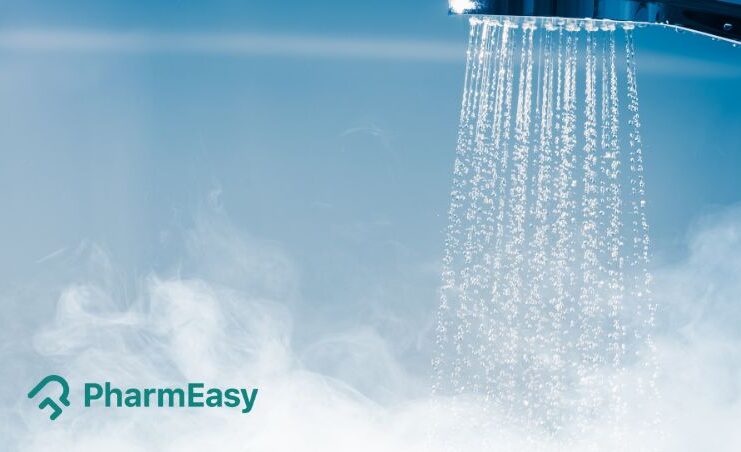Do Hot Showers Do More Harm Than Good?
By Dr. Nikita Toshi +2 more

Get,

to manage your symptom
Get your,


4 Cr+ families
benefitted

OTP sent to 9988776655



You’ve successfully subscribed to receive
doctor-approved tips on
Whatsapp

Get ready to feel your best.

Hi There,
Download the PharmEasy App now!!


Register to Avail the Offer
Send OTPBy continuing, you agree with our Privacy Policy and Terms and Conditions

Hi There,
Sign up on PharmEasy now!!
Trusted by 4 crore+ families

OTP sent to 9988776655



You have unlocked 25% off on medicines




Code: NU25
By Dr. Nikita Toshi +2 more
Table of Contents
The temperature of water you shower with matters more than you can fathom. While many people prefer hot water showers as they help them shake the laziness away, some also prefer cold showers as it makes them more alert and ready to take on the day. Especially in the winter, when one usually lacks the motivation to get into the shower, the thought of hot water running over the body is a rather enticing one. But are frequent hot showers really a good idea? What is the right temperature of water for a shower? Read on to know more about hot water shower disadvantages and the right temperature of water to shower with.
Hot showers definitely promise relaxation as they are a warm embrace, especially in the winter months. They help the body to relieve muscle tension and get rid of fatigue and while rendering some extra benefits to the skin. In a nutshell, taking a hot water shower brings along the following benefits:

While hot water showers enhance mobility and maybe your only reason to even shower in the first place, they definitely need to be limited and for more than one reason.
If you prefer taking a hot shower over a cold one or you are someone who needs to quickly hop into a hot shower to help you sleep well at night, then you are overdoing it. Showering with very hot water does more harm than good. Hot showers are known to activate the parasympathetic part of the nervous system that makes you feel tired and want relaxation, often sleep-induced. But, its far-reaching effects are hardly restricted to just the physical and internal. If you find yourself looking into the mirror and asking, does a hot water shower damage your hair? Then the answer is in the affirmative. Some other side effects of showering with hot water are:
Using lukewarm water is the answer! Proven by science, using lukewarm water on the body while washing the hair with normal temperature water does wonders for you, and not just in the winter. It is only understandable that anything extreme is bad news; the same goes for using water at extreme temperatures for showers. While both do have their benefits, they are not just restricted to that; they come along with certain disadvantages as well.
Using lukewarm water for your shower serves the purpose of taking a shower without any need to worry about its detrimental impact.
Having taken a look at hot water shower side effects and having established the viability of a lukewarm shower instead, it is imperative to ask this follow-up question. The answer lies in striking a healthy balance between hot and cold water temperatures. The perfect temperature is one which is neither too hot nor too cold but just the right mix to wash off muscle tension and get you ready for the day or a good night’s sleep, whichever may be the case.
While using lukewarm water on the body is the best-case scenario, using the same on your head is advised against. Instead, using cold water to wash your head is a welcome move.
Showering with excessively hot or cold water yields differing effects and are best when avoided. Since the only purpose of taking a shower is not just washing off the dirt and grime, it is important to give the deserved impetus to the right temperature of water. Using lukewarm water not just serves the purpose of a shower, but also helps you to eliminate the worry that accompanies using hot or cold water. The ideal temperature for Indian winters and offering extra care for your body and skin, lukewarm water just made getting in the shower more rewarding than it already was!
Disclaimer: The information provided here is for educational/awareness purposes only and is not intended to be a substitute for medical treatment by a healthcare professional and should not be relied upon to diagnose or treat any medical condition. The reader should consult a registered medical practitioner to determine the appropriateness of the information and before consuming any medication. PharmEasy does not provide any guarantee or warranty (express or implied) regarding the accuracy, adequacy, completeness, legality, reliability or usefulness of the information; and disclaims any liability arising thereof.
Links and product recommendations in the information provided here are advertisements of third-party products available on the website. PharmEasy does not make any representation on the accuracy or suitability of such products/services. Advertisements do not influence the editorial decisions or content. The information in this blog is subject to change without notice. The authors and administrators reserve the right to modify, add, or remove content without notification. It is your responsibility to review this disclaimer regularly for any changes.

Leave your comment...
Comments